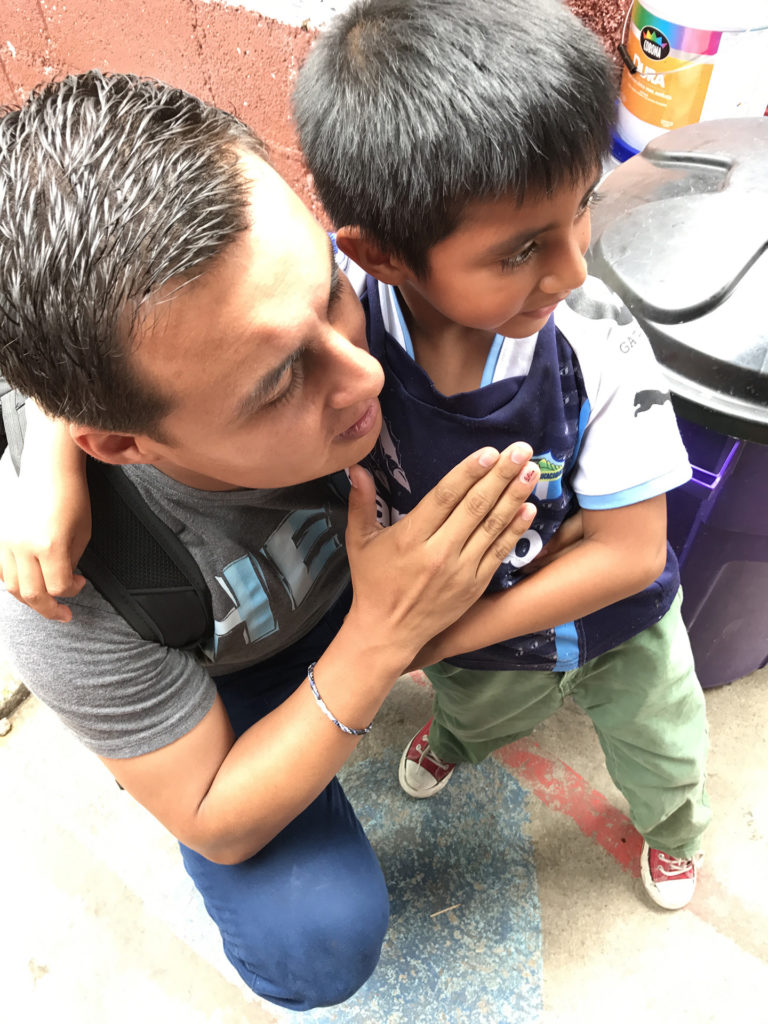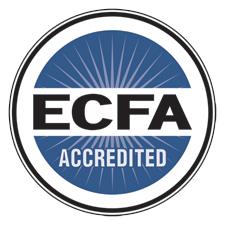Hello, I have written a few blogs for HopeChest Insights, and I think it is time that I introduce myself! My name is Dana Bright, and I am the Content Manager for Children’s HopeChest. I have been a part of the HopeChest team for just over two months, and it has been a blessing to become a part of the work that HopeChest does to advocate for orphaned and vulnerable children. I am especially excited to share this blog with you in preparation of celebrating Father’s Day.
I overheard a high school student talking with one of our Community Partnership Managers (CPM) about her recent HopeChest mission trip. She went to Guatemala and was eager to meet her sponsor child and interact with the children who attend the CarePoint. She described how she noticed that the children gravitated towards the boys who were on the trip instead of the girls, even when the girls approached them with open arms.
The CPM explained that this is a ubiquitous experience in most countries that HopeChest works in because of the lack of positive male figures in these children’s lives. Many children who visit our CarePoints do not have a father present due to loss, abandonment, or neglect. This Father’s Day, Children’s HopeChest wants to honor the men at our CarePoints who step into a leadership position for the children who have lost a father or a mother, or both. Our CarePoint staff are present to listen to these children, build them up with encouragement and wisdom, and show them that they are loved and valuable.
We are excited to highlight and introduce you to Nestor, Lead Program Officer in Guatemala. Although he is not a father, he has taken on many of the roles of a father for the CarePoint children. He gets to know them through spending time with them and asking them questions. He builds them up by encouraging them and communicating that they are loved and valued. He shares his life with them, and is present with them.
_______________________________________________
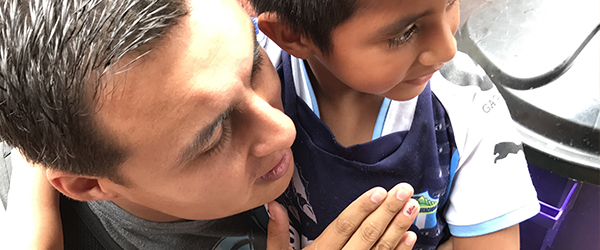
As a man on our staff in Guatemala, tell us about a man who has had an impact on your life?
Two men have made an impact in my life:
My father. After being away from home, I realized my father has shaped a lot of who I am today. His examples of being kind and offering help to others all the time, being able to assist, to do a quality job and to seek for justice and rightness. He also developed different skills in my life by taking us to work in the fields–farming, construction, and similar jobs.
A mentor I met over 10 years ago. His example of life and his willingness to be open to listen all the time. He was also a teacher and a friend to me. He was always able to talk about life with no cliches or repetitive speeches. He is the kind of person who makes the hard questions and tells you what you need to hear, not necessarily what you want to hear. His understanding of the Kingdom and how that impacts the whole life of a person.
What is your favorite activity with the CarePoint children?
With the little children I like to ask them about their description of God. What they imagine he looks like and why.
With the older ones, I like to listen to them. They always have something to say. I keep asking them “the hard” questions that will drive me to the root of what they are sharing.
Describe how have you seen the Guatemalan staff, CarePoint leaders, stand up and care for “the fatherless?”
There are leaders strongly advocating for justice against judge’s rulings in the cases of specific children. Some leaders still today carry physical and emotional scars for fighting for children. In those cases, sometimes CarePoint leaders have to officially ask the judge to reconsider their decisions.
Other times, leaders have walked through legal prosecutions involving other children. Occasionally, leaders open their own homes to shelter children in trouble or who have been abandoned. At times, leaders call children as their own sons or daughters and interact with them with love.
At other times, these children have been legally adopted by CarePoint leaders. I can remember times when leaders called me, in tears of joy, as they can’t resist their emotions when one of the children succeed and overcome problems or after listening to the judge make the right decision for the wellbeing of a child.
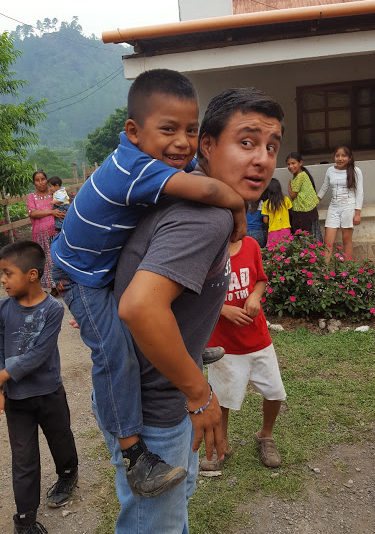
Tell us a little about the families that the children who come to our CarePoints come from, particularly with regard to those who are “fatherless?”
All of the children we work with come from a vulnerable situation or live in an at-risk area. Many come from broken families. Those children need attention, love, and care. Sometimes they react to defend themselves because that was the world they were living in. Some children expect something bad after receiving a hug from the staff at the CarePoint. After being part of a CarePoint, it’s common to find children in a Remedial Education Program, because they never attended school, and now they need to speed up a little because of their age. It’s also common to find children undernourished and with severe dental problems.
The most impactful experience I have had, was with a girl who, at that time, was four years old. She had experienced abuse. Her natural reaction was to stay away from all men at the CarePoint. The first time I met her, she ran away from me, crying out loud. After three months of consistent visits and observing how I greeted the other children with a hug and a kiss every time, this little girl ran to me with arms wide open and gave me a hug for the first time.
Tell us why you think male role models are important in the communities we serve?
In the type of ministry we develop with children, it is very common to find women serving at the CarePoints and taking leadership; which I think is awesome that God has them working very hard and pouring their lives to the communities.
But many times, men don’t want to be involved with children; and even worse, some children have suffered horrible situations from men. Other children grow in communities where men are bad examples and robbing, being unfaithful to a wife, or having more than one family is common. Young boys need people to look up to, as a role model to follow and become men of God, good persons to their communities, leading stable families.
Children need good examples of people that do good in the society. Men overcoming their own limitations, growing in similar situations as the children to be positive examples of the living gospel. They need to see men who show what it really means to be a man in behavior, faith, and relationships.
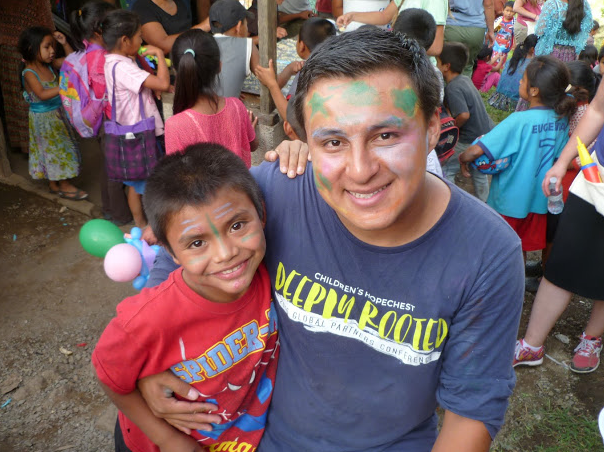
Why have you dedicated so much of your time and commitments to caring for “the fatherless”/orphaned and vulnerable children?
Because they matter. Because we all are called to care for the orphan and the widow. Because it’s a human ability to care one for another, and if I know all these I can’t ignore them. Because a different future is possible for them too, and show them the love and abundant life there is in Jesus. To get to the point, they need real people to show them and help them find the way.
Can you explain a special moment that you had with a child that was impactful to you?
One girl, a teenager, didn’t want to continue attending school. Even though she knew the CarePoint leaders will send her anyway, she didn’t have motivation to continue working hard. In one of my visits, after talking for awhile, we discovered that the problem was a specific class and a classmate who was bullying her really bad.
We decided to work together in homework and getting ready for the final test. Also, she decided to talk to the principal at the school about this classmate. My surprise is when I heard she did a great job in her final test; and, not only that, she actually enjoyed the class because she understood the topics and was able to explain to others. Our celebration was with chocolate cake at the end of school year, which was her favorite kind of cake.
_____________________________________________________
Although we can never fill the loss that these children experience, Children’s HopeChest is determined to meet these children in their loss and provide a nutritious meal, basic medical care, and strong, healthy relationships. When children visit a HopeChest CarePoint, they are surrounded by strong leadership and adults who communicate that they are loved, valuable, and have a purpose.

